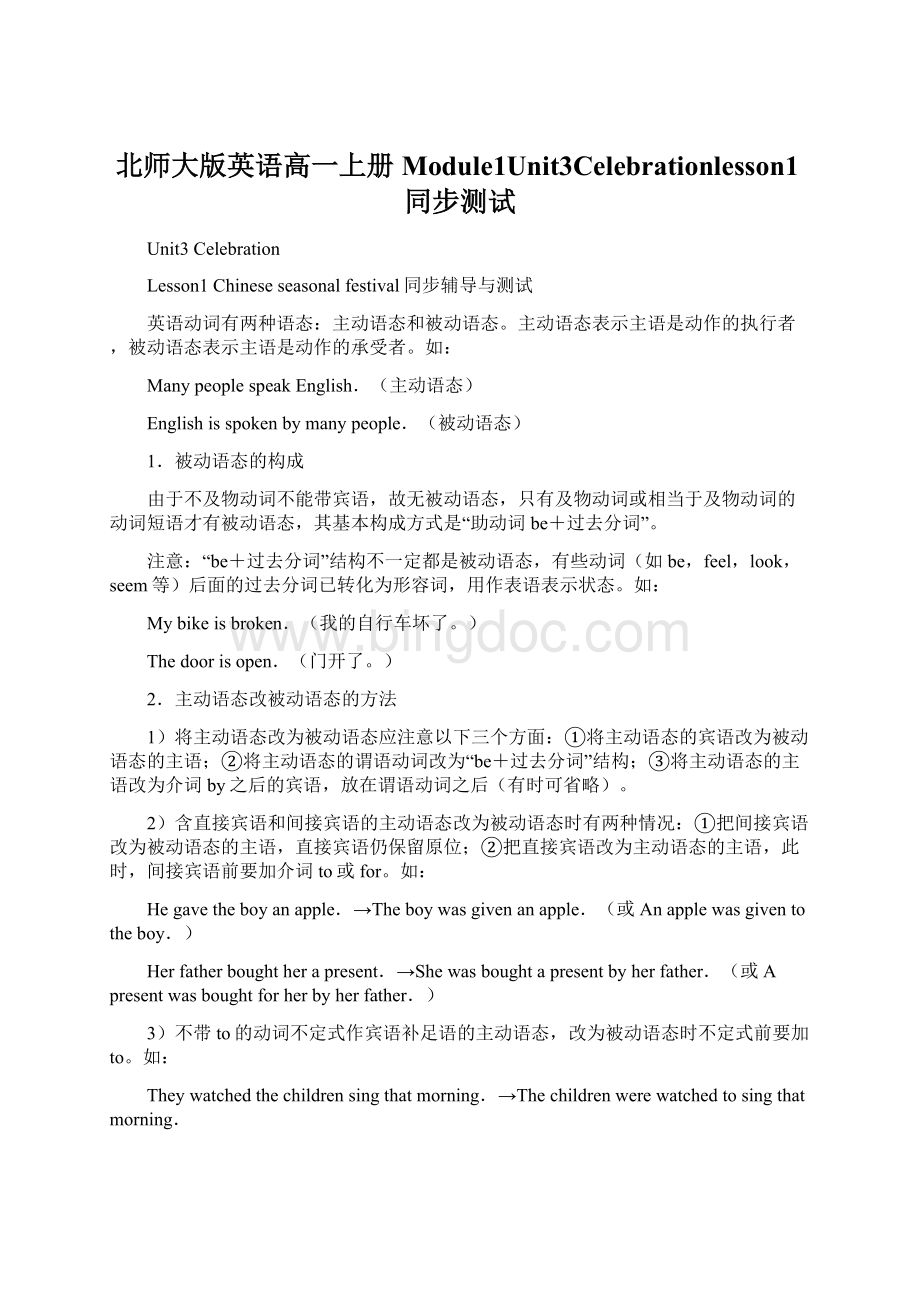北师大版英语高一上册Module1Unit3Celebrationlesson1同步测试.docx
《北师大版英语高一上册Module1Unit3Celebrationlesson1同步测试.docx》由会员分享,可在线阅读,更多相关《北师大版英语高一上册Module1Unit3Celebrationlesson1同步测试.docx(12页珍藏版)》请在冰点文库上搜索。

北师大版英语高一上册Module1Unit3Celebrationlesson1同步测试
Unit3Celebration
Lesson1Chineseseasonalfestival同步辅导与测试
英语动词有两种语态:
主动语态和被动语态。
主动语态表示主语是动作的执行者,被动语态表示主语是动作的承受者。
如:
ManypeoplespeakEnglish.(主动语态)
Englishisspokenbymanypeople.(被动语态)
1.被动语态的构成
由于不及物动词不能带宾语,故无被动语态,只有及物动词或相当于及物动词的动词短语才有被动语态,其基本构成方式是“助动词be+过去分词”。
注意:
“be+过去分词”结构不一定都是被动语态,有些动词(如be,feel,look,seem等)后面的过去分词已转化为形容词,用作表语表示状态。
如:
Mybikeisbroken.(我的自行车坏了。
)
Thedoorisopen.(门开了。
)
2.主动语态改被动语态的方法
1)将主动语态改为被动语态应注意以下三个方面:
①将主动语态的宾语改为被动语态的主语;②将主动语态的谓语动词改为“be+过去分词”结构;③将主动语态的主语改为介词by之后的宾语,放在谓语动词之后(有时可省略)。
2)含直接宾语和间接宾语的主动语态改为被动语态时有两种情况:
①把间接宾语改为被动语态的主语,直接宾语仍保留原位;②把直接宾语改为主动语态的主语,此时,间接宾语前要加介词to或for。
如:
Hegavetheboyanapple.→Theboywasgivenanapple.(或Anapplewasgiventotheboy.)
Herfatherboughtherapresent.→Shewasboughtapresentbyherfather.(或Apresentwasboughtforherbyherfather.)
3)不带to的动词不定式作宾语补足语的主动语态,改为被动语态时不定式前要加to。
如:
Theywatchedthechildrensingthatmorning.→Thechildrenwerewatchedtosingthatmorning.
4)带复合宾语的动词在改为被动语态时,一般把主动语态的宾语改为主语,宾语补足语在被动语态中作主语补足语。
如:
WecallhimXiaoWang.→HeiscalledXiaoWang.
Hecuthishairshort.→Hishairwascutshort.
Theytoldhimtohelpme.→Hewastoldtohelpme.
5)短语动词是不可分割的整体,改为被动语态时要保持其完整性,介词或副词不可遗漏。
如:
Wemusttakegoodcareoftheyoungtrees.→Theyoungtreesmustbetakengoodcareof.
6)含有宾语从句的主动结构变为被动结构时,通常用it作为被动结构的先行主语,从句放在句子后面;也可采用另一种形式。
可以这样转换为被动结构的动词有know,say,believe,find,think,report等。
如:
Peoplebelievethatheisill.→Itisbelievedthatheisill.(或:
Heisbelievedtobeill.)
3.被动语态改为主动语态的方法:
被动语态中介词by后的宾语改为主动语态中的主语(或按题意要求确定主语),按照这个主语的人称和数以及原来的时态把谓语动词形式由被动语态改为主动语态。
注意在主动语态中有的动词要求不带to的动词不定式作宾语补足语,此时要把被动语态中的to去掉。
被动语态的主语用来作主动语态的宾语。
如:
Historyismadebythepeople.Thepeoplemakehistory.
4.不能用于被动语态的情况
1)某些表示“静态”的及物动词(表示状态而不是动作,而且常常是不可用于进行时态的动词)如have,fit,suit,hold(容纳),cost,suffer,last(持续)等不能用于被动语态。
如:
Theyhaveanicecar.他们有一辆漂亮的汽车。
Myshoesdon'tfitme.我的鞋不合适。
Mybraincan'tholdsomuchinformationatonetime.我的脑子一下子记不住这么多资料。
Howmuch/Whatdoesitcost?
这值多少钱?
Ourholidaylasts10days.我们的假期有十天。
Thisfoodwilllast(them)(for)3days.这食物足够(他们)(吃)三天。
2)不是所有带介词的动词都能用于被动结构。
若是构成成语动词通常有被动态,若不构成成语动词则无被动态。
试比较:
Theyarrivedatadecision.Adecisionwasarrivedat.他们作出了决定。
Theyarrivedatthestation.他们到达车站。
(不说:
Thestationwasarrivedat.)
Helookedintothequestion.Thequestionwaslookedinto.他调查了这个问题。
3)动词leave(离开),enter(进入),join(参加)不可用于被动语态。
如:
Thecarlefttheroadandhitatree.车子离开了道路,撞上了树。
4)某些及物动词可作不及物动词用,特别是后加副词(如well,easily等)时。
主动语态有被动含义,这类动词常见的有sell,write,wear,wash,cook,open,close,lock,read,record等。
如:
Hisnewnovelissellingwell.他的新小说很畅销。
Theclothwasheswell.这布很耐洗。
Thismaterialwon'twear.这种材料不耐穿。
Hisplaywon'tact.他的戏剧不会上演。
Thewindowwon'tshut.这窗关不上。
Thedoorwon'topen.这门打不开。
Thedoorwon'tlock.这门锁不上。
Thispoemreadswell.这首诗读来很好。
5)feel,look,appear,sound,taste,smell等由实意动词演变而来的系动词,后接形容词作表语,不可用于被动语态。
如:
Tellmeifyoufeelcold.你要是感到冷就告诉我。
You'relookingveryunhappy—what'sthematter?
你看来很不高兴———怎么回事儿?
Thesouptasteswonderful.这汤味道好极了。
Thoserosessmellbeautiful.那些玫瑰好闻极了。
Sheappearstobefriendly.她看上去很友好。
6)宾语是不定式或动词的-ing形式时,不可用于被动语态。
如:
Peterhopedtomeether.彼得希望遇见她。
MrSmithenjoyedseeinghisdaughter.史密斯先生喜欢看他的女儿。
7)宾语是反身代词或相互代词时,不可用于被动语态。
如:
Shecandressherself.她可以自己穿衣服。
Wecouldhardlyseeeachotherinthefog.在雾中我们彼此几乎看不见。
8)宾语是同源宾语时,不可用于被动语态。
如:
Theyliveahappylife.他们过着幸福的生活。
Thegirldreamedasweetdream.那女孩做了个甜美的梦。
9)宾语带有与主语有照应关系的物主代词时,不可用于被动语态。
如:
Theoldmanbrokehis(=theoldman's)legs.那老人把自己的腿弄断了。
Thegirlshookher(=thegirl's)head.那女孩摇了摇头。
5.某些动词的主动形式表被动含义
英语中有很多动词如act,break,catch,cut,clean,drive,draw,let,lock,open,sell,read,write,wash,wear等,当它们被用作不及物动词来描述主语特征时,其主动形式常用来表达被动含义。
另外,像owe,beat,cook,bake,print,build,make等,有时可以用主动形式表达被动含义。
如:
Thiskindofradiodoesn'tsellwell.这种收音机不太畅销。
Theshopopensateighto'clock.这个商店八点开门。
Thepipedoesnotdrawwell.这烟斗不太通畅。
Theseplaysactwonderfully.这些剧演得好。
Kate'sbookreadslikeaninterestingnovel.凯特的这本书读起来像本有趣的小说。
注意:
主动表被动强调的是主语的特征,而被动语态则强调外界作用造成的影响。
如:
Thedoorwon'tlock.门锁不上。
(指门本身有毛病)
Thedoorwon'tbelocked.门不会被锁上。
(指不会有人来锁门)
Hisnovelsselleasily.他的小说销路好。
(指小说本身内容好)
Hisnovelsaresoldeasily.他的小说容易销售。
(主要强调外界对小说的需求量大)
6.某些动名词的主动形式表被动含义
1)在need,want,require,deserve和bear等词的后面,动名词用主动形式表示被动含义,其含义相当于动词不定式的被动形式。
如:
Thehouseneedsrepairing(toberepaired).这房子需要修理。
Myclothesneedwashing(tobewashed).我的衣服需要洗了。
2)形容词worth后面跟动名词的主动形式表示被动含义,但不能跟动词不定式;而worthy后面跟动词不定式的被动形式。
如:
Thepicture-bookiswellworthreading.(=Thepicture-bookisveryworthytoberead.)这本画册很值得一读。
SuchamanasMr.Smithisnotworthhelping.(=SuchamanasMr.Smithisnotworthytobehelped.)像史密斯先生那样的人不值得帮助。
Thisplanisnotworthconsidering.(=Thisplanisnotworthytobeconsidered.)这个计划不值得考虑。
3)某些动词不定式的主动形式表被动含义
a.当nice,easy,fit,hard,difficult,important,impossible,pleasant,interesting等形容词后跟不定式作状语,而句子的主语又是动词不定式的逻辑宾语时,这时常用不定式的主动形式表达被动含义。
如:
Japaneseisnotdifficulttolearn.日语并不难学。
(指日语被学)
Thewaterisunfittodrink.这水不适合喝。
(指水被喝)
Thepieceofmusicispleasanttohear.这首音乐听起来很悦耳。
(指音乐被听)
Thisbookiseasytoread.这本书读起来很容易。
(指书被读)
b.当动词不定式在名词后面作定语,不定式和名词之间有动宾关系时,不定式的主动形式表示被动含义。
如:
Ihavealotofworktodotoday.我今天有很多工作要做。
(worktodo指被做的工作)
Hehasthreechildrentolookafter.他有三个孩子要照看。
(childrentolookafter指孩子被照看)
注意:
如果以上句型用动词不定式的被动形式,其含义有所区别。
如:
Ihavesomeclothestobewashed.我有些要洗的衣服。
(衣服不是自己洗)
c.在therebe...句型中,当动词不定式修饰名词作定语时,不定式用主动或被动式,其含义没有什么区别。
如:
Thereisalotofhomeworktodo(tobedone).有很多家庭作业要做。
Therearesomeclothestowash(tobewashed).有些衣服要洗。
4)由介词for,on,above,under等构成的短语有时可以表达被动含义。
如:
Hispaintingswillbeonshowtomorrowafternoon.=Hispaintingswillbeshowntomorrowafternoon.他的油画作品明天下午展出。
5)表示感官意义的连系动词如smell,feel,taste,look,sound等在句子中常表达被动含义。
如:
Hownicethemusicsounds!
这音乐听起来多悦耳!
Goodmedicinetastesbitter.良药苦口。
Ourschoollooksmorebeautifulthanbefore.我们学校看上去比以前更漂亮了。
被动语态专项练习一
一、选择题
()1._____anewlibrary_____inourschoollastyear?
A.Is;builtB.Was;bulitC.Does;buildD.Did;build
()2.Anaccident____onthisroadlastweek.
A.hasbeenhappenedB.washappenedC.ishappenedD.happened
()3.Cotton____inthesoutheastofChina.
A.isgrownB.aregrownC.growsD.grow
()4.Sofar,themoon____bymanalready.
A.isvisitedB.willbevisitedC.hasbeenvisitedD.wasvisited
()5.AtalkonChinesehistory_____intheschoolhallnextweek.
A.isgivenB.hasbeengivenC.willbegivenD.gives
()6.Howmanytrees____thisyear?
A.areplantedB.willplantC.havebeenplantedD.planted
()7.Alotofthings____bypeopletosavethelittlegirlnow.
A.aredoingB.arebeingdone
C.hasbeendoneD.willbedone
()8.Neitherofthem______inChina.
A.ismadeB.aremadeC.weremadeD.made
()9.Thedoctor_____foryet.
A.isn'tsentB.hasn'tbeensentC.won'tbesentD.wasn'tsent
()10.--When___thiskindofcomputers______?
--Lastyear.
A.did;useB.as;usedC.is;usedD.are;used
()11.TheGreatWall____allovertheworld.
A.knowsB.knewC.isknownD.wasknown
()12.I____insummer.
A.bornB.wasbornC.havebeenbornD.amborn
()13.HesaysthatMr.Zhang_____tothefactorynextweek.
A.issentB.wouldsendC.wassentD.willbesent
()14.Themonkeywasseen_____offthetree.
A.jumpB.jumpsC.jumpedD.tojump
()15.Theschoolbag___behindthechair.
A.putsB.canbeputC.canbeputtedD.canput
二、将下列句子变为被动语态,每空一词。
1.Wecanfinishtheworkintwodays.
Thework_______________intwodays.
2.TheyproducesilkinSuzhou.
Silk__________inSuzhou.
3.ThechildrenwillsinganEnglishsong.
AnEnglishsong___________bythechildren.
4.Youneedn'tdoitnow.
It______________byyounow.
5.Peopleusemetalformakingmachines.
Metal________formakingmachines.
6.Hemademedothatforhim.
I________________thatforhim.
7.Didtheybuildabridgehereayearago?
____abridge____herebythemayearago?
8.We'llputonanEnglishplayinourschool.
AnEnglishplay_____________oninourschool.
9.Mybrotheroftenmendshiswatch.
Hiswatch____________bymybrother.
10.Wemustwatertheflowerseveryday.
Theflowersmust______(byus)everyday.
11.Theyuseknivesforcuttingthings.
Knives______forcuttingthings.
12.Didhebreakthewindowyesterday?
____thewindow__________yesterday?
13.Theyhavesoldoutthelightgreendresses.
Thelightgreendresses_____________out.
14.Wecleantheclassroomeveryday.
Theclassroom________everyday.
三、用动词的正确语态填空。
1.Thestudents_____often_____(tell)totakecareoftheirdesksandchairs.
2.Thatplay________(put)onagainsometimenextmonth.
3.Theoldmanisill.He______(mustsend)tothehospital.
4.Vegetables,eggsandfruits_________(sell)inthisshop.
5.What___aknife______(make)of?
6.APianoconcert_____________(give)herelastFriday.
7.______themagazine____(cantake)outofthelibrary?
8.Theroom_____________(clean)bymeeveryday.
9.Thestars_____________(cansee)inthedaytime.
10.Someflowers__________(water)byLiMingalready.
11.Thesekindsofmachines__________(make)inJapan.
12.Russian____________(learn)asthesecondlanguagebysomestudentsinChina.
13.Thecinema___________(build)in1985.
14.Thebike______________(mustnotput)here.
15.Abeautifulhorse___________(draw)byJohnnextday.
16.Thiskindofmachine___________(canmade)byuncleWang.
17.ThePLA____________(found)onAugust1st,1927.
18.Bythetimehewasten,theboy________(learn)EnglishandFrench.
19.______you____